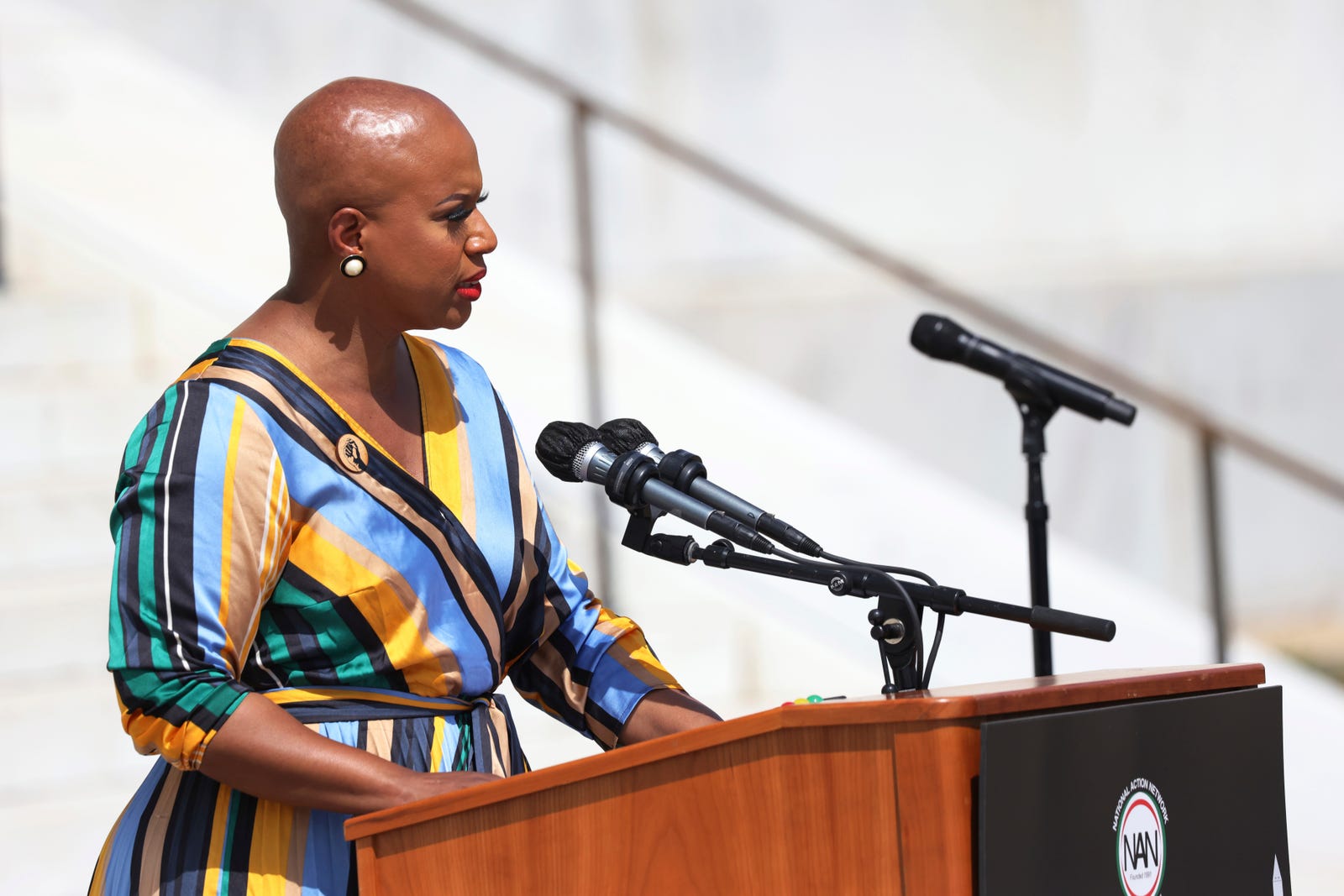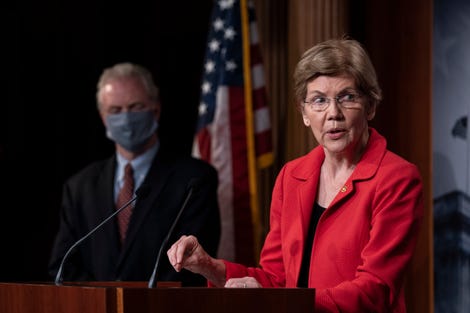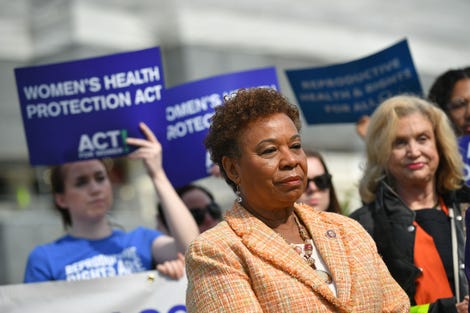America F'd up 
yall just don't know

yall just don't know







 Tulsi
Tulsi



‘Most influential voice’: Warren’s network spreads throughout Biden administration
politico.com
‘Most influential voice’: Warren’s network spreads throughout Biden administration
Zachary Warmbrodt
8-10 minutes
There is a growing list of people in President Joe Biden's administration who are backed by Elizabeth Warren and other progressives. | Alex Wong/Getty Images
Wall Street was relieved when Sen. Elizabeth Warren was passed over for the leadership of the Treasury Department. But now the financial industry faces another threat: President Joe Biden is enlisting a small army of her former aides and allies to run his government.
Warren's expanding network in the upper echelons of the administration includes protégés who helped execute her aggressive oversight of big banks and other corporations as well as friends who share her views of the risks looming on Wall Street. But it goes beyond finance, covering pivotal posts at the Department of Education and even the National Security Council.
The Warren recruits mark a victory for the progressive movement, which has supported her yearslong "personnel is policy" campaign to chip away at the dominance of corporate insiders in setting policy for Democrats. Those who took on the fight with Warren say they're pleasantly surprised it has produced so many results under Biden, reflecting a new emphasis on inequality and challenging corporate power. Industry lobbyists, in turn, warn that banks, private equity firms and consumer lenders should pay close attention.
The appointments "confirm that Sen. Warren will be the most influential voice in the financial policy debate under the new administration," said Karolina Arias, a former Democratic Senate aide who is now a partner at Federal Hall Policy Advisors.
The growing list of Biden personnel backed by Warren and other progressives illustrates the leftward shift underway in the Democratic Party's approach to policymaking, which was also seen in the $1.9 trillion aid package that Biden signed into law Thursday.
"No one should be surprised Sen. Warren has virtually hand-picked the financial and other regulatory nominations she cares deeply about," said Consumer Bankers Association President Richard Hunt, who represents banks that have faced withering criticism from Warren and her allies.
The Warren alumni at senior levels of the executive branch include banking and economic policy staffers who spent years leading her office's oversight of Wall Street. Bharat Ramamurti is now deputy director of the White House National Economic Council and Julie Siegel is Treasury deputy chief of staff.
Other former Warren aides in the administration include Julie Morgan, a senior adviser at the Education Department; Anne Reid, deputy chief of staff at the Department of Health and Human Services; and Sasha Baker, senior director of strategic planning at the National Security Council.
"Getting the right people in those slots is really important," Warren said in a December interview. "And it's not only the top slots, it's also the deputies and assistants. The people who do the hard work day in and day out to develop policies and then to execute them."
Other close allies have also been nominated for key posts.
Adewale "Wally" Adeyemo, who helped Warren launch the Consumer Financial Protection Bureau, is Biden's pick to be deputy Treasury secretary. FTC Commissioner Rohit Chopra, another former CFPB official, is awaiting confirmation to lead the consumer bureau. Leandra English, also a CFPB alum, is chief of staff of the NEC.
Gary Gensler, known for cracking down on big banks as a post-financial crisis regulator, is the nominee for Securities and Exchange Commission chair, a position that in the past Warren and her staff have invested significant effort trying to influence. Even Treasury Secretary Janet Yellen worked closely with Warren when Yellen was Federal Reserve chair, a position the economist attained thanks in part to political pressure that Warren and other progressives applied on then-President Barack Obama.
A person familiar with Warren and Yellen’s relationship said it’s one “based on deep mutual respect and shared values” and that they have spoken often since Yellen’s confirmation.
The growing list has prompted comparisons to other powerful — and longer-serving — Senate leaders who were able to place large numbers of former aides across government, including six-term Sen. Richard Shelby (R-Ala.), whose "Shelby mafia" held several key financial regulatory roles in the Trump administration.
The records and views of many of the picks reflect a marked shift from the more centrist- and business-aligned economic policy leadership of the Clinton and Obama administrations. For Warren and other progressives, that could give them a clear advantage in campaigns on student loan cancellation, child-care financing and climate change, as well as potential tax hikes on the wealthy and giant corporations.
There is regular contact at "all levels" between Biden's world and Warren's, two people familiar with the interaction said. Warren and White House Chief of Staff Ron Klain talk regularly, they said.
Those familiar with Warren's thinking said she is also focusing on unfilled administration positions dealing with antitrust and higher education as well those at the Office of Information and Regulatory Affairs and Treasury.
Not long after Warren joined the Senate in 2013, she led a strategic push to try to rebalance the party's policymaking apparatus. She openly criticized Democrats for recruiting so many Wall Street veterans to administration posts in what she dubbed the "Citigroup clique." She derailed Obama's nomination of investment banker Antonio Weiss to the Treasury Department. And she hounded then-SEC Chair Mary Jo White for not doing enough to protect investors. Warren was poised to play a similar role if Hillary Clinton had won the presidency in 2016.
"[T]here is danger anytime the key economic positions in our government fall under the control of a single tight-knit group," Warren wrote in POLITICO in 2014. "Old ideas can stay around long after they’re useful, and new ideas don’t get a fair hearing."
Biden's 2020 presidential primary victory over Warren and Sen. Bernie Sanders (I-Vt.) gave some on Wall Street reason to cheer, as did his decision to pass over Warren for the Treasury Department. Finance executives are betting that Biden will reject some of the more dramatic proposals to rein in the industry as he focuses on stabilizing the economy in the wake of the pandemic.
But progressive policy advocates say financial firms shouldn't get comfortable, even with a moderate in the presidency.
Jeff Hauser, executive director of the watchdog group the Revolving Door Project, said, "Warren has become the center of gravity for people who think the economy has gotten out of whack and that better governance could set things right." Top Biden aides responsible for staffing his administration are more traditional Democrats, Hauser said, but "it makes sense that when trying to staff an executive branch that can produce real results for people and a legacy for their boss, they looked to people associated with Warren."
While Biden isn't calling for a major crackdown on Wall Street, regulators who have close connections to Warren and other progressives will be able to rewrite rules for finance and pursue tougher enforcement actions. The dynamic could manifest the next time another financial firm stumbles after taking big risks or hurting customers.
"There isn't going to be any time wasted trying to get up to speed when faced with the next incident," said Compass Point director of policy research Isaac Boltansky, who served on the bank bailout oversight panel that Warren chaired after the 2008 financial crisis. "We're talking about people who have been steeped in policy nuance for years, have a fervent belief in the role of government and policing bad actors, and who know what policy levers to pull in order to accomplish that goal."



Tulsi
 She'll get her shine come 2024 though.
She'll get her shine come 2024 though. 